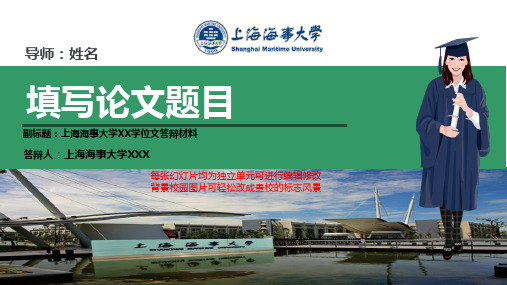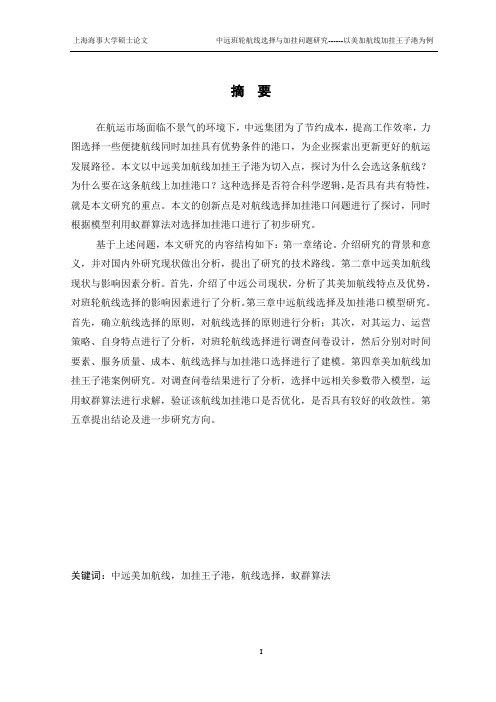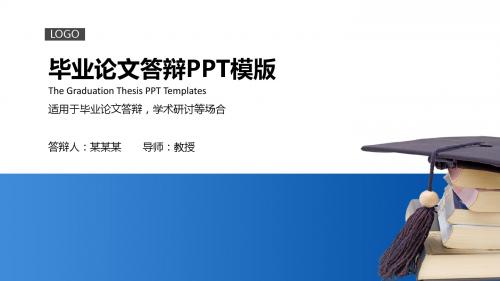上海海事大学论文封面
上海海事大学大学生毕业答辩毕业论文毕业答辩开题报告优秀PPT模板

国内研究三:
您的内容打在这里,或者通过复制您的文本后, 在此框中选择粘贴,并选择只保留文字。您的 内容打在这里,或者通过复制您的文本后,在 此框中选择粘贴,并选择只保留文字。
毕业论文答辩PPT模板
专业:土木工程
答辩人: 导师:
主 目 录 CONTENTS
课题背景及内容
THE BACKGROUND OF THE SUBJECT AND CONTENT
1
研究思路及过程
THE RESEARCH MENTALITY AND THE PROCESS
3
解决方案及总结
SOLUTIONS AND SUMMARY
国外研究一:
您的内容打在这里,或者通过 复制您的文本后,在此框中选择 粘贴,并选择只保留文字。您的 内容打在这里,或者通过复制您 的文本后,在此框中选择粘贴, 并选择只保留文字。
研 究 意 义 THE SIGNIFICANCE
研究 意义
1
点击输入简要文字内 容,文字内容需概括 精炼,不用多余的文 字修饰,言简意赅的 说明分项内容……
字号请根据你的内容多少,及演示需要调整大小。
地区 现状
国 内 外 相 关 研 究 Related research
国内研究一:
您的内容打在这里,或者通过复制您的文本后, 在此框中选择粘贴,并选择只保留文字。您的 内容打在这里,或者通过复制您的文本后,在 此框中选择粘贴,并选择只保留文字。
国内研究二:
等,即需要在学业完成前写作并提交的论文,是教
学或科研活动的重要组成部分之一。
上海海事大学本科毕业论文答辩ppt模板动态可编辑模板

导师:姓名填写论文题目副标题:上海海事大学XX 学位文答辩材料答辩人:上海海事大学XXX每张幻灯片均为独立单元可进行编辑修改背景校园图片可轻松改成贵校的标志风景绪论界定与表征合理交通结构影响因素辨识干预对策主要内容1绪论2研究方法与思路3关键技术与实践难点4研究成果与应用5论文总结目录Contents绪论界定与表征合理交通结构影响因素辨识干预对策主要内容请您在此编辑上海海事大学论文内容,或者通过复制您的文本后,在此框中选择粘贴,并选择只保留文字。
请您在此编辑上海海事大学论文内容请您在此编辑上海海事大学论文内请您在此编辑上海海事大学论文内容请您在此编辑上海海事大学论文内容。
上海海事大学论文-选题背景标题添加标题请您在此编辑上海海事大学论文内容请您在此编辑上海海事大学论文内容请您在此编辑上海海事大学论文内容添加标题点击添加上海海事大学论文内容,在此编辑上海海事大学论文内容,在此框中选择粘贴,并选择只保留绪论界定与表征合理交通结构影响因素辨识干预对策主要内容国内研究综述请您在此编辑上海海事大学论文内容,请输入上海海事大学论文内容在此编辑上海海事大学论文内容国外研究综述请您在此编辑上海海事大学论文内容,请输入上海海事大学论文内容在此编辑上海海事大学论文内容绪论界定与表征合理交通结构影响因素辨识干预对策主要内容点击添加标题研究意义您的内容打在这里,请您在此编辑上海海事大学论文内容,请输入上海海事大学论文内容在此编辑上海海事大学论文内容请您在此编辑上海海事大学论文内容,请输入上海海事大学论文内容在此编辑上海海事大学论文内容。
点击添加标题请您在此编辑上海海事大学论文内容,请输入上海海事大学论文内容在此编辑上海海事大学论文内容请您在此编辑上海海事大学论文内容,请输入上海海事大学论文内容在此编辑上海海事大学论文内容请您在此编辑上海海事大学论文内容,请输入上海海事大学论文内容在此编辑上海海事大学论文内容。
点击添加标题输入上海海事大学论文内容在此编辑上海海事大学论文内容。
硕士学位论文-中远班轮航线选择与加挂问题研究---以美加航线加挂王子港为例

摘要在航运市场面临不景气的环境下,中远集团为了节约成本,提高工作效率,力图选择一些便捷航线同时加挂具有优势条件的港口,为企业探索出更新更好的航运发展路径。
本文以中远美加航线加挂王子港为切入点,探讨为什么会选这条航线?为什么要在这条航线上加挂港口?这种选择是否符合科学逻辑,是否具有共有特性,就是本文研究的重点。
本文的创新点是对航线选择加挂港口问题进行了探讨,同时根据模型利用蚁群算法对选择加挂港口进行了初步研究。
基于上述问题,本文研究的内容结构如下:第一章绪论。
介绍研究的背景和意义,并对国内外研究现状做出分析,提出了研究的技术路线。
第二章中远美加航线现状与影响因素分析。
首先,介绍了中远公司现状,分析了其美加航线特点及优势,对班轮航线选择的影响因素进行了分析。
第三章中远航线选择及加挂港口模型研究。
首先,确立航线选择的原则,对航线选择的原则进行分析;其次,对其运力、运营策略、自身特点进行了分析,对班轮航线选择进行调查问卷设计,然后分别对时间要素、服务质量、成本、航线选择与加挂港口选择进行了建模。
第四章美加航线加挂王子港案例研究。
对调查问卷结果进行了分析,选择中远相关参数带入模型,运用蚁群算法进行求解,验证该航线加挂港口是否优化,是否具有较好的收敛性。
第五章提出结论及进一步研究方向。
关键词:中远美加航线,加挂王子港,航线选择,蚁群算法ABSTRACTIn order to save costs and improve efficiency in the sluggish economic environment, COSCO Group chooses a number of convenient flights and adds a number of ports for enterprises, trying to explore a more suitable way for their development. This paper, a tentative study on the north china /usa southwest coast express service(CEN) increased by COSCO to adding a port of Prince Rupert, demonstrates that the choice of routes in many aspects such as strengths and research results improves the operational efficiency of ships and growth in revenue. In the paper, the author investigates why this route is selected, why a port is added to this route, whether the choice is consistent with logic, etc., with the focus laid upon the reasons.This essay lay emphasis to discuss routing choosing and port calling from a creative viewpoint, and by using the modal of ant algorithm, the author try to present a preliminary study of choosing additional calling port.This paper is structured as follows:Chapter 1 is to brief the research background and its significance, analyze the research status, and then introduce the main technical route.Chapter 2 is to analyze the COSCO of CEN and factors of routes. First , factors and principles of analyzed, followed by the port of choice on the liner were analyzed again on the liner's hull form, the questionnaire was analyzed and presented.Chapter 3 is to investigate the COSCO of CEN choice theory and to add a port models reach. First ,established the principle of route choice, and then analyze the route selection, followed by its capacity, operating strategy, its own characteristics were analyzed. Respectively, the time factor, quality of service, cost, route selection and to add a port to model selection .Chapter 4 is about CEN case study. Select the relevant parameters into the model, using ant colony algorithm is proposed to verify whether the optimal route to add a port.Chapter 5 is the conclusion and further research.Xi Dianyu (Transportation Planning & Management)Directed by Lin Guolong (Professor)Key Words:CEN;Adding the port of Prince Rupert; Route selection; Ant Algorithm目录摘要 (I)ABSTRACT (II)第一章绪论 (1)1.1 选题背景及意义 (1)1.1.1 选题背景 (1)1.1.2研究意义 (1)1.2 国内外研究现状 (1)1.3 主要内容和技术路线 (5)第二章中远美加航线现状与影响因素分析 (7)2.1 中远公司美加航线分析 (7)2.1.1中远公司介绍 (7)2.1.2 美加航线设置及特点 (8)2.1.3 美加航线操作特点分析 (9)2.2 中远美加航线加挂加拿大港口王子港定性分析 (12)2.2.1 美加航线运力升级 (12)2.2.3加拿大港口王子港优势分析 (13)2.3集装箱航线所涉及因素介绍 (15)2.3.1集装箱航线设计因素 (15)2.3.2集装箱班轮航线船舶因素 (15)2.3.3集装箱班轮航线运营因素 (16)2.3.4集装箱班轮航线集装箱管理因素 (17)2.3.5集装箱航线影响因素间关系分析 (18)第三章中远集运航线选择及加挂港口模型研究 (20)3.1 集装箱港口航线选择原则 (20)3.1.1集装箱航线港口选择原则分析 (21)3.1.1.1对时间要素的分析 (21)3.1.1.2生产性停泊时间 (22)3.1.1.3 非生产性停泊时间 (23)3.1.1.4自然因素引起的停泊时间 (23)3.1.1.5运用航线合作手段分析 (25)3.1.2中远集装箱航线的选择分析 (27)3.1.2.1 集装箱班轮航线单航线选择 (27)3.1.2.2 集装箱航线港口选择分析 (28)3.1.2.3 航线所需船型选择 (29)3.1.2.4航线加挂港口选择 (30)3.1.2.5航线上竞争与合作分析 (30)3.1.2.6 调查问卷设计 (30)3.2模型的建立 (33)3.2.1 时间要素模型 (33)3.2.2 服务质量模型 (34)3.2.3 成本模型 (35)3.2.4 航线加挂港口选择模型 (36)3.3模型的求解 (36)3.3.1 蚁群算法理论 (37)3.3.2 蚁群算法工作原理 (38)3.3.3 算法分析 (43)第四章美加航线加挂王子港案例研究 (44)4.1 调查问卷结果分析 (44)4.2 实验参数 (46)4.3 算法适用性分析 (47)4.4评价模型的实证研究 (49)4.5小结 (50)第五章结论与进一步研究方向 (51)5.1结论 (51)5.2进一步研究方向 (52)致谢 (53)研究生期间学术成果 (54)参考文献 (55)附录1:蚁群算法求解程序代码 (59)附录2: 选择港口调查表 (64)第一章绪论1.1 选题背景及意义1.1.1 选题背景中远集团是我国最大的集装箱运输企业,它的业务量及运力居世界前列,为中国的经济发展和航运业的拓展做出巨大贡献。
上海海事大学好看的毕业设计答辩模板毕业论文毕业答辩开题报告优秀PPT模板

请在此处添加幻灯片标题
在此处添加小标题
在此添加正文并根据需要调整字体大小, 建议采用1.5倍行距和两端对齐方式。
在此处添加小标题
在此添加正文并根据需要调整字体大小, 建议采用1.5倍行距和两端对齐方式。
请在此处 添加关键字
000T
000T
000T
000T
000T
000T
000T
000T
000T
000T
请在此处添加幻灯片标题
73%
请在此添加正文并根据需要调整字体大小,建议采用1.5倍行 距和两端对齐方式。建议采用1.5倍行距和两端对齐方式。请 在此添加正文并根据需要调整字体大小,建议采用1.5倍行距 和两端对齐方式。
请在此添加图片说明 请在此添加图片说明
请在此添加正文并根据需要调整字体大小,建议采用1.5倍行 距和两端对齐方式。建议采用1.5倍行距和两端对齐方式。请 在此添加正文并根据需要调整字体大小,建议采用1.5倍行距 和两端对齐方式。
在此处添加小标题
请在此添加正文并根据需要调整字体大小,建议采用1.5倍 行距和两端对齐方式。请在此添加正文并根据需要调整字体 大小,建议采用1.5倍行距和两端对齐方式。
感谢聆听
请在此处添加小标题
请在此处添加正文并根据需要调整字体大小,建 议采用1.5倍行距和两端对齐方式。请在此处添加 正文并根据需要调整字体大小。
请在此处添加小标题
请在此处添加正文并根据需要调整字体大小,建 议采用1.5倍行距和两端对齐方式。请在此处添加 正文并根据需要调整字体大小。
请在此处添加小标题
请在此处添加正文并根据需要调整字体大小,建 议采用1.5倍行距和两端对齐方式。请在此处添加 正文并根据需要调整字体大小。
SMU外语学院-硕士毕业论文格式-070317

外国语学院外国语言学及应用语言学硕士生撰写毕业论文须知(2007-3—20)一、撰写论文注意事项:1.Literature Review(文献综述)1。
1 Literature Review是学位论文必不可少的组成部分,一般包括在导论部分(导论的其他部分一般包括选题的缘起或背景,选题的意义,研究宗旨,本研究课题的创新点,研究方法或理论框架,论文结构安排等)。
学位论文如果没有Literature Review,人家就不知道你是在什么样的基础上从事本项研究,就会认为你根本就不懂如何搞研究。
1.2Literature Review应择要引述本研究领域前人的研究成果,可以引用国内外学者在本研究领域的观点,并进行必要的综合分析和归纳,以表明你对你所研究的问题已有比较全面深入的了解,你的研究是在前人研究基础上的进一步推进。
(往年有些同学在Literature Review中确实引述了前人的不少观点,但往往与论文主要内容关系不很密切,也有同学引述他人观点按作者分段,每个作者单独一段,显得太机械,体现不出论文作者的综合分析能力。
可将相同或相近的内容或观点合并在一段或几段之内综述。
)1。
3 在Literature Review的结尾处应表明自己有什么观点或进行了何种综合分析.如有创新点,有自己有独立的见解、观点,哪怕只有一丁点,最好明确写清楚(如写明创新点在第几章、第几节)。
如没有特别的创新点,也可表明本论文重在综合分析,已把各家的观点、各书的内容综合在一起,比现有的专著、论文、教材更详细、更全面。
还可表明自己的分类体系与传统的体系有所不同,等等.总之,你需表明你的论文在哪一点上或在哪些方面胜过了前人。
这部分内容也可从Literature Review 中分离出来,单独作为导论的一部分处理,以突出本研究课题的创新点或胜过前人之处。
2.Abstract摘要顾名思义是提供论文内容梗概,重点是结论,使得读者通过有限的字数了解论文的主要内容和创新之点。
【新】上海海事大学论文ppt

选题背景及意义
The background and significance
选题背景
选题意义
(一)现实意义
网络营销是借助于互联网技术来实现一定营销目标的新型营销方式,由于它具有传播范围广、速度 快、不受时空限制、成本低等特点。
(二)社会意义
在网络环境下,即使是中小企业都可以通过电子布告栏、在线讨论广场、电子邮件等方式,以极低的
研究方法
120 100 80 60 40 20 0 类别一 类别二 类别一 类别一
The research methods
研究方法
销售额
第一季度
第二季度
第三季度
第四季度
The research methods
研究方法
图表标题
6 5 4
坐标轴标题
3 2 1 0 类别 1 类别 2 类别 3 类别 4
系列 1 系列 2 系列 3
坐标轴标题
CONTENT
选题背景及意义 论文综述 研究方法
The background and significance
The Paper reviews
The research methods
论题总结
The summary
论题总结
The summary
添加名称
添加名称
CONTENT
选题背景及意义 论文综述 研究方法
The background and significance
Байду номын сангаас
The Paper reviews
The research methods
论题总结
The summary
选题背景及意义
The background and significance
上海海事大学毕业论文答辩ppt模板

您的内容打在这里,或者通过复制您的文本后,在此框中选择粘 贴,并选择只保留文字。您的内容打在这里,或者通过复制您的 文本后,在此框中选择粘贴,并选择只保留文字。
添 加 标 题
您的内容打在这里,或者通过复制您的文本后,在此框中选择粘贴,并选择只保留文字。您的内容打在这里, 或者通过复制您的文本后,在此框中选择粘贴,并选择只保留文字。 第 18 页
添加标题内容
您的内容打在这里,或者通过 复制您的文本后,在此框中选 择粘贴,并选择只保留文字。
添加标题内容 添加标题内容
您的内容打在这里,或者通过 复制您的文本后,在此框中选 择粘贴,并选择只保留文字。 您的内容打在这里,或者通 过复制您的文本后,在此框 中选择粘贴,并选择只保留 文字。
第 21 页
第6 页
理论基础与文献综述
01 输入内容 02 输入内容 03 输入内容 04 输入内容 05 输入内容
您的内容打在这里,或者通过复制您的文本后,在此框中选择粘贴,并选 择只保留文字。您的内容打在这里,在此框中选择粘贴,并选择只保留文字。
您的内容打在这里,或者通过复制您的文本后,在此框中选择粘贴,并选 择只保留文字。您的内容打在这里,在此框中选择粘贴,并选择只保留文字。
添加标题内容
您的内容打在这里,或者通过 复制您的文本后,在此框中选 择粘贴,并选择只保留文字。
第 20 页
市场调研分析
添加标题内容
您的内容打在这里,或者通过 复制您的文本后,在此框中选 择粘贴,并选择只保留文字。
添加标题内容
您的内容打在这里,或者通过 复制您的文本后,在此框中选 择粘贴,并选择只保留文字。
02 添加标题内容
1
2
您的内容打在这里,或者 通过复制您的文本后,在 此框中选择粘贴,并选择 只保留文字。
上海海事大学论文封面

海事大学法学院院系法学院专业年级法律硕士(非法学)学生姓名武红梅学号 1指导教师二○一四年十二月论我国不动产善意取得制度构成要件之第三人善意摘要善意取得制度是民法中一项重要的制度,其形成发展历史悠久,在各国立法中均占有重要地位。
一般认为,善意取得制度起源于日耳曼法中的“以手护手”原则。
近现代民法的善意取得制度是在“以手护手”原则的基础上,吸纳了罗马法取得时效中的善意要件,才得以产生并发展起来的。
善意取得制度适用于动产,己为法学界广为认可。
对于我国善意取得制度的建立,《中华人民国物权法》( 以下简称《物权法》) 的颁布无疑具有里程碑式的意义。
《物权法》不仅首次在立法层面上确立了善意取得制度,而且在善意取得的构造方面独树一帜,力推“一体化”模式,别异于其他国家或地区之立法。
我国《物权法》在第106条明确规定了不动产善意取得制度,但是第三人善意作为此制度重要的构成要件之一,我国物权法对其规定却是模糊不明确的。
如:过失时如何认定第三人善意。
当受让人是轻过失或轻微过失时此过失的造成往往是由于受让人不具备相关专业知识造成,若将此注意义务强加给受让人会造成受让人在不动产交易时的谨小慎微,甚至陷入“恶魔证明”,显然与善意取得初衷相违背; 当受让人有重大过失时则不应认定为善意,此时受让人有违一般人交易之注意义务,应承担交易之不利后果,否则对原所有权人有违公平正义。
笔者认为应在客观上对善意作出合理的解释,即为善意的认定制定一些客观化的判断依据。
笔者在本文中从客观角度论述不动产善意取得制度之善意要件。
第一章是善意取得制度善意的概述。
分别阐述了善意的概念、善意的特点及善意的具体要求,将善意的涵清晰地揭示出来。
第二章是不动产善意取得中善意的判断依据及排除情形。
首先,对于不动产善意取得中善意的判断依据,笔者分析了几种学说,即积极说与消极说。
通过《物权法》开始实施后的我国首例不动产善意取得制度第一案——“保姆盗卖主人房屋”案件最后得出结论笔者赞成善意的消极观念说。
- 1、下载文档前请自行甄别文档内容的完整性,平台不提供额外的编辑、内容补充、找答案等附加服务。
- 2、"仅部分预览"的文档,不可在线预览部分如存在完整性等问题,可反馈申请退款(可完整预览的文档不适用该条件!)。
- 3、如文档侵犯您的权益,请联系客服反馈,我们会尽快为您处理(人工客服工作时间:9:00-18:30)。
海事大学法学院院系法学院专业年级法律硕士(非法学)学生姓名武红梅学号 1指导教师二○一四年十二月论我国不动产善意取得制度构成要件之第三人善意摘要善意取得制度是民法中一项重要的制度,其形成发展历史悠久,在各国立法中均占有重要地位。
一般认为,善意取得制度起源于日耳曼法中的“以手护手”原则。
近现代民法的善意取得制度是在“以手护手”原则的基础上,吸纳了罗马法取得时效中的善意要件,才得以产生并发展起来的。
善意取得制度适用于动产,己为法学界广为认可。
对于我国善意取得制度的建立,《中华人民国物权法》( 以下简称《物权法》) 的颁布无疑具有里程碑式的意义。
《物权法》不仅首次在立法层面上确立了善意取得制度,而且在善意取得的构造方面独树一帜,力推“一体化”模式,别异于其他国家或地区之立法。
我国《物权法》在第106条明确规定了不动产善意取得制度,但是第三人善意作为此制度重要的构成要件之一,我国物权法对其规定却是模糊不明确的。
如:过失时如何认定第三人善意。
当受让人是轻过失或轻微过失时此过失的造成往往是由于受让人不具备相关专业知识造成,若将此注意义务强加给受让人会造成受让人在不动产交易时的谨小慎微,甚至陷入“恶魔证明”,显然与善意取得初衷相违背; 当受让人有重大过失时则不应认定为善意,此时受让人有违一般人交易之注意义务,应承担交易之不利后果,否则对原所有权人有违公平正义。
笔者认为应在客观上对善意作出合理的解释,即为善意的认定制定一些客观化的判断依据。
笔者在本文中从客观角度论述不动产善意取得制度之善意要件。
第一章是善意取得制度善意的概述。
分别阐述了善意的概念、善意的特点及善意的具体要求,将善意的涵清晰地揭示出来。
第二章是不动产善意取得中善意的判断依据及排除情形。
首先,对于不动产善意取得中善意的判断依据,笔者分析了几种学说,即积极说与消极说。
通过《物权法》开始实施后的我国首例不动产善意取得制度第一案——“保姆盗卖主人房屋”案件最后得出结论笔者赞成善意的消极观念说。
其次论述了善意排除的情形,分别为:明知无处分权的情形;应知而未知无处分权的情形。
第三章是不动产善意取得中善意的证据时点,通过叶冰松诉陆小峰与周忠兰夫妻房屋买卖案,来解释证据取得时间对于法院判决的影响。
第四章是不动产善意取得中善意的举证责任。
关键词:善意取得制度,构成要件,证据时点The Study on the Third Person in Good Faith of the Bona Fide Acquisition of Real Property in ChinaABSTRACTThe Bona Fide Acquisition is an important system in civil law, which has a long history and occupies an important position in all countries in the world. In generally, The Bona Fide Acquisition originated from” Hand in hand with Protection” Principle of Germanic.Modem civil law of the good faith system is on the basis of the principle of "hand in hand”, and absorbs goodwill elements in the Roman law usucapion, to produce and develop. For the establishment of the good faith system in our country, the property law of the People's Republic of China (hereinafter referred to as the "property law") undoubtedly has the milestone significance. The property law not only established the good faith system in the legislative level for the first time, and in the construction of good faith, pushed” integration" mode, which was different from those of the legislation of other countries or regions."Property law" in article 106 stipulates clearly the system of real property in good, but the third person in good faith as a system, one of the important component of the property law in China, is not clear and vague. For example, what is considered about fault when the third personin good faith. When the assignee is light fault or a misdemeanor, as a result of the negligence of tend to be the transferee does not have relevant professional knowledge. If the duty of care imposed on the assignee will cause the transferee timidity in real estate transactions, even in "demon proof”, which obviously conflicts with good faith purpose. When the assignee with gross negligence, should not be recognized as goodwill. The receiving party is against the duty of care as average person, who should bear the adverse consequences of the transaction. Otherwise the original owner contrasts to justice. The author thinks that should be objectively made a reasonable explanation on goodwill, which for the cognizance of goodwill provides some objective judgment. The author in this article studies goodwill, from the objective Angle of the system of real property.The first chapter is an overview of the goodwill in the Bona Fide Acquisition, which respectively expounds the concept of good faith, to the specific requirements of the characteristics of goodwill and goodwill, to the connotation of the goodwill clearly revealed.The second chapter is the analysis made in the judgment of goodwill and ruled out. First of all, the real estate in good faith judgment of goodwill, the author analyzes several theories, namely the positive and negative. After the property law initiated by a system of our country's first real property in good-Chengdu "nanny stolen master houses" case, finally the author comes to the conclusion in favor of goodwill negative said. Secondly the author discusses the goodwill is ruled out, respectively: knowing of unauthorized disposition; unauthorized disposition should be known, unknown situations.The third chapter is the analysis obtained evidence of goodwill in point, with Ye Bingsong v. Liu Xiaofeng Zhou Zhonglan couples in home sales, to explain the evidence obtained time effect on the court.The fourth chapter is the analysis made in the goodwill of the burden of proof.KEY WORDS: The Bona Fide Acquisition,GOODWILL,PROOF第1章第三人善意概述1.善意的概念善意是一个抽象的概念,它存在于人们的理念之中。
